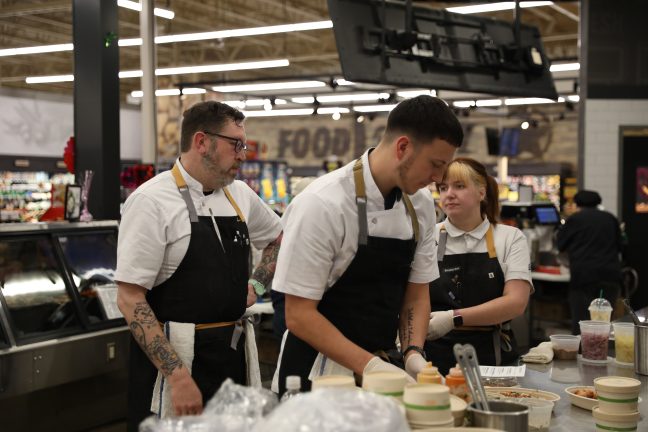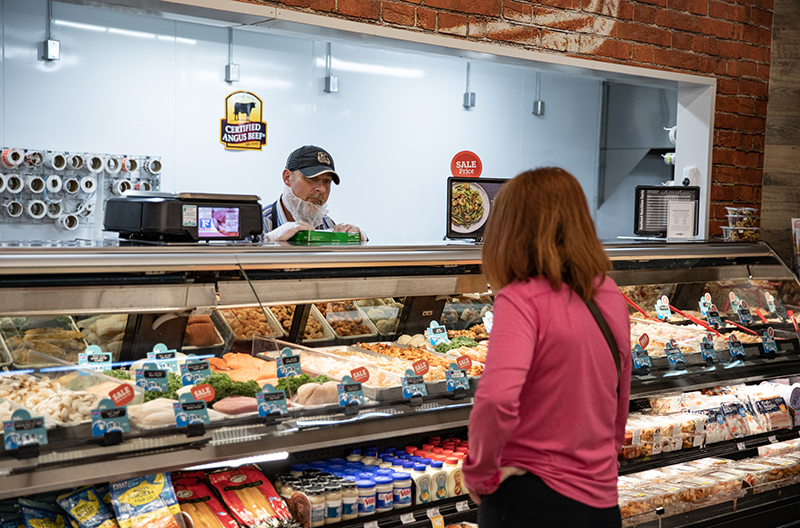Food City, The Shelby Report of the Southeast’s Retailer of the Year, is in the people business, according to its president, Steve Smith. The grocer focuses on growing from within through its people while continuously exceeding customer expectations.
It all starts with hiring.
“Calm and friendly and making sure we bring the right teammates into our organization to move forward,” said John Jones, EVP/director of store operations. “We’ve got people that come with us at a young age and work their whole careers here, which I think is exciting. And we’re a melting pot.”
As Food City has grown its footprint, the company has created a unique environment for associates. Its “family-based culture” is readily apparent. At the same time, it hopes to continue to learn from others.
“We’ve been very fortunate over the years to take in new stores and their teammates and be able to work with them on our culture, but also learn something about their culture, what makes them special and what that can do for our business,” Jones explained.
To honor associates who join the company via acquisition, Food City recognizes their hiring date on name badges.
“People are proud of those years that they’ve been somewhere, so we honor that and they keep that date with all the benefits that come with that date…length of service is important. It’s important to us and it’s important to the people who served it,” Jones said.

The retailer recognizes different lengths of service by awarding pins, watches and other keepsakes.
Jones himself has been with Food City for 43 years. When asked why he has stayed so long, he credits the culture.
“I think people work at a certain place for different reasons. But for me, it’s a family-based culture, it’s a family atmosphere,” he said. “I’ve felt like I can contribute here. I enjoy seeing other people succeed around me and seeing young people come up and do different things. Not a lot of people here get real caught up on taking credit for things. We work on it together and take credit together.”
When Jones started with the company, Food City was a predominately retail business. It has since expanded into distribution, procurement, marketing, advertising and other areas. This leads to Food City’s unofficial policy of “cross-pollinating” employees.
Cross-pollination refers to cross-training employees to understand as many different aspects of the business as possible. They are encouraged to step out of their comfort zone to experience different parts of the store or company, Jones said.
“I’ve got several meat managers who are store managers,” he said.
Associates can show initiative and volunteer for cross-training. As they move up the leadership chain, store and hiring managers are encouraged to speak with associates to gauge interest, encourage growth and recommend training paths.
“When I mentor or talk to younger people who say they want to do what I’m doing, I encourage them and say, ‘You need to learn these other parts of the business. You need to learn merchandising, you need to learn marketing, you need to learn warehousing, you need that total experience.’ I think that encourages them to be well-rounded. And I think it’ll help them as they try to advance,” Jones explained.
Katie Penny, district manager-Chattanooga division, went through the manager training program after joining Food City full time in 2020. She said it was a way for her to “fully understand and appreciate the business as a whole.” She sees it also as a tool to develop and place people in the correct environment.
“The pipeline [is] full of people to be ready for the new stores and new developments we’ve got coming up,” she said. “We’ve got to keep them growing, keep them learning. And it excites me to see people rise to the challenge when they come out of those training programs.
“We do that strategically with the right store manager to help get them ready. I’ve probably got two or three in my district right now that are on one- to two-year plans to take on a store because that’s what the business needs. And they understand their role and responsibilities and know how to make an impact on the communities.”
Food City: E-Commerce Experience Exceeding Customers’ Expectations

